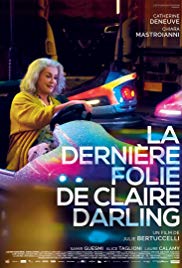
CLAIRE DARLING/ LA FOLIE DE CLAIRE DARLING
France, 2019, 90 minutes, Colour.
Catherine Deneueve, Chiara Mastroianni, Alice Taglione, Laure Calamy, Amid Guesmi, Oliver Rabourdin, Johan Leysen.
Directed by Julie Bertucelli.
This is the kind of film that you would expect from France, something of a domestic story, some human and some tragedy, with Catherine Deneuve in the lead. (And, something of a tribute to her, that she has been headlining films in France, but also internationally, for 55 years.)
Actually, the direct English title is misleading, especially with the evocative charm of the word “darling�. This title is merely partial. The French title adds “La Folie de�, which we might translate as “mad whim� or, at least, “foolish whim�.
And the whim opens the film, Claire waking up in the morning, deciding that this is the last day of her life, that she needs to set up a garage sale and get rid of everything in her house – and it is one of those fine houses, full of paintings, art objects, valuable pieces as well is knickknacks.
Obviously, Catherine Deneuve is at home in this kind of role. Claire is in her late 70s and is beginning to show signs of dementia. Out everything goes, her co-opting workers from the local quarry which her husband used to own, crowds gathering on and her getting rid of everything at extremely cheap prices.
But, we wonder, what has led to this. It means then the film incorporates quite a number of flashbacks, Alice Taglioni stepping in for the younger Claire. These flashbacks at first introduce her two children, Martin and Marie. It is also suggested that there has been a long estrangement from her daughter – who then turns up, concerned about her mother, linking again with her, and Marie herself going into flashbacks of the past. Interestingly, Marie is played by Catherine Deneuve’s actual daughter, Chiara Mastroianni.
As the day goes on, mother and daughter talk to each other, with flashbacks to their father at a crucial sequence where he physically collapses and Claire begins to phone for an ambulance, she remembering the story one way, her daughter remembering another.
Other characters include a friend of Marie from the past who is upset at the garage sale, wanting some kind of control for Claire. There is also the best friend of Claire’s son, Marie reassuring him that she did not blame him for the accident in the quarry for her brother.
While much of the screenplay suggest that this is ‘c’est la vie’, the ending is not quite what we expect but does include Claire visited by a priest friend and her asking him to perform and exorcism on her house – but, after Claire’s wandering on the street, collapsing, being taken to hospital, meandering out of hospital, it is simply boiling a kettle for a cup of tea while local fireworks light up the sky, that brings the story to its close.
Come to think of it,, tres, tres francaise.
1. The title? The extra nuance of the French title and the mad whim? Typical of French dramas? Family? Stories of the past, guilt and regrets? Age and prospect of death?
2. The French country town, the mansion, exteriors, the interiors, the range of decorations and ornaments? The garage sale? The town, the streets, the quarry? The flight, the fireworks? The burning house? The musical score?
3. Catherine Deneuve and her place in French cinema? For 55 years? The screen presence? Working with her daughter Chiara Mastroiannni?
4. The portrait of Claire, age, beauty? Waking up, the day of her death? The whim of the title? The garage sale, the advertisements, getting the young men from the quarry to carry everything, the range of customers, the cheap prices, eventually their being sent away? The touch of dementia? The prospect of dining? As a person, her memories, the flashbacks with her family, her son and imagining him at the piano, her daughter and the clock in the bedroom, her husband, the news of the death of their son, her anger and being upset? Her husband’s collapse, her picking up the phone, her not calling the ambulance? Asking her daughter later – and her being reassured that she did call the ambulance? The erratic behaviour throughout the day, becoming tired, the meeting with Martine? Memories of the past, the souvenirs, Martine wanting to call off the sale?
5. Marie, her arrival, estrangement from her mother, memories of the past? Her concern? Memories of her father, of her brother, his death, her father’s collapse and the phone call? Memories of Ahmid? His surviving when her brother died? The bond between them? Going to the quarry? Her relationship with her mother, the sale, calming her down? Her mother in hospital, leaving?
6. Claire and her sense of failure as a mother, the sense of guilt, the death of her husband, the relationship with Pere George, his visit, concern, reassuring her, her wanting him to perform an exorcism, his bringing the vestments, performing the actual ceremony? Claire, confused, lying down, going out on the road, the approaching car, her collapse, hospital, leaving?
7. Some sense of peace with her past, reconciliation with Marie? Memories of Martin? Putting on the kettle, the gas not igniting? The spark, the house and the conflagration?
8. A reflection on age, the meaning of life, guilt, grace, reconciliation and atonement?